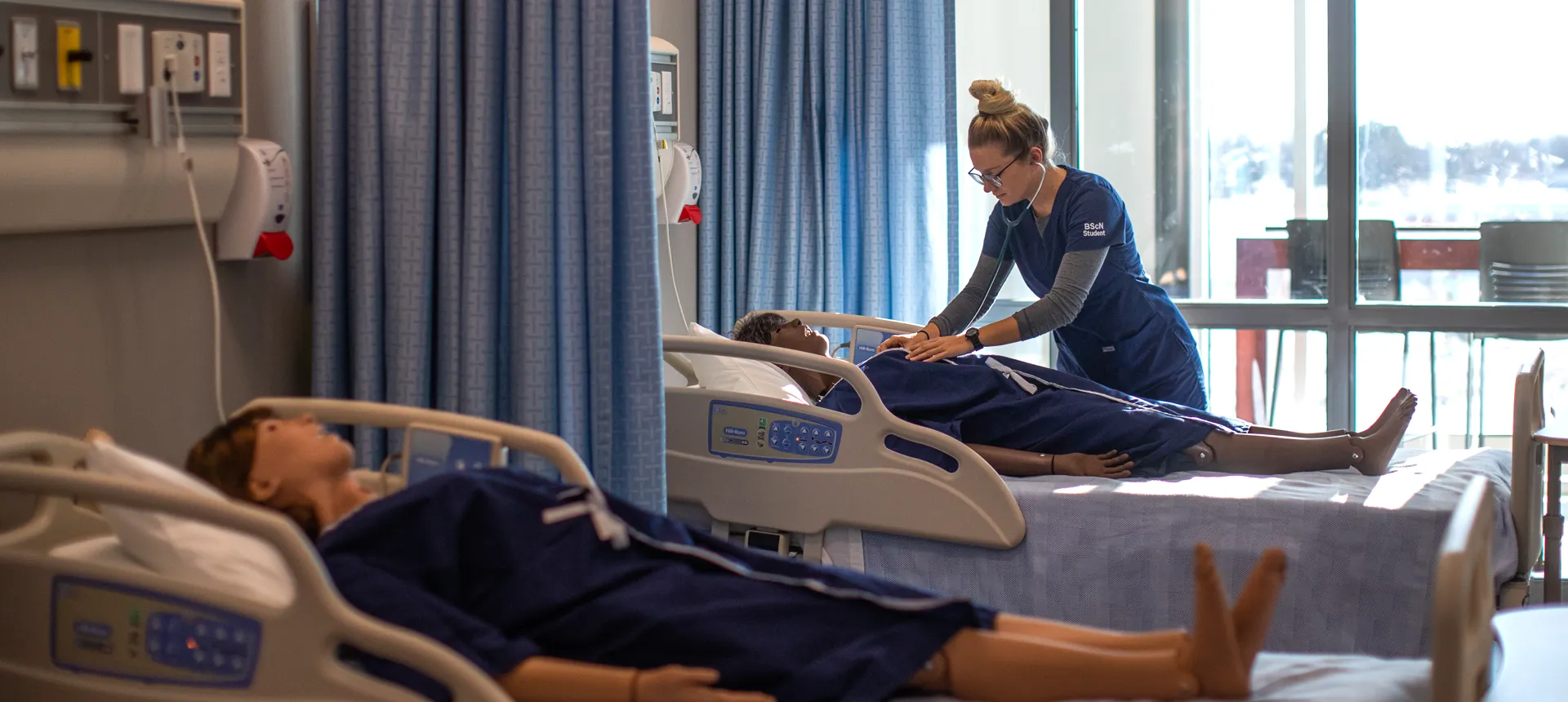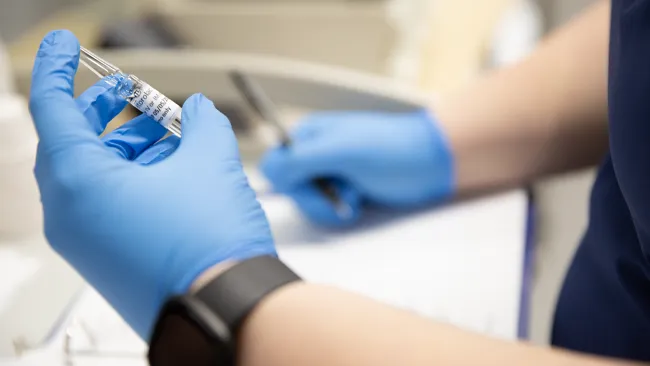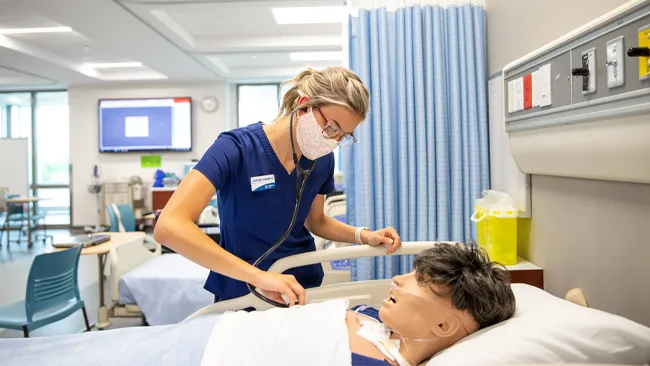Overview
Designed with the working Registered Practical Nurse in mind, this bridging program builds upon theoretical knowledge and refreshes technical skills to allow graduates to transition to the roles and responsibilities of an RN.
The Registered Practical Nursing Bridging to Honours Bachelor of Science - Nursing degree program has been designed with the practising Registered Practical Nurse in mind. Prior knowledge and skill acquired through the successful completion of the Practical Nursing program has been considered to develop a program of study that serves to broaden the foundational knowledge required of the nursing profession.
Some of the courses in the first year will have flexible learning options for students which include in-person/on-campus, online, and a hybrid format.
When students return to year two of the program, they join students entering the third year of the Honours Bachelor of Science - Nursing Degree program and complete courses until the end of the program. Year four of the program is completely in-person at Lambton College or in Clinical Placement.
Students entering the program have a total of five years to complete the requirements of the Honours Bachelor of Science - Nursing Degree program.
Courtney's Journey
Hear why Courtney chose to return to school to pursue the Registered Practical Nursing Bridging to Honours Bachelor of Science - Nursing program.
Listen to how her passion and dedication led her to pursue an exciting and rewarding career in Nursing.
Admission Requirements
- Must be a Registered Practical Nurse with the College of Nurses of Ontario by January 31, 2024 and must be in good standing
- Must have an overall average of B (73% - 75%) with no failures or repeats in core nursing courses of the Practical Nursing program (doesn't include General Education Electives)
Training Requirements
Students entering this program are required to have Non-Violent Crisis Intervention and Gentle Persuasive Approach training before beginning their studies.
Costs
- Year 1 $7,373.64
Please Note: These fees apply to the 2024-2025 academic year and are subject to change. Fees do not include books (unless specifically noted), supplies or living costs.
Additional Fees
-
Textbooks and Digital Software - annual fee$1,200.00
-
CPR - recertification (annual fee)$80.00
-
Mask Fit Testing - annual fee$40.00
-
Name Tag & Chest Patch with coloured stripe$25.00
-
Uniforms (2)$180.00
-
Duty Shoes - all white or black leather - no mesh or cloth$170.00
-
Watch - with second hand$70.00
-
Stethescope - Littmann Classic 3 or more advanced$200.00
-
Lab kit - first year$200.00
-
Lab kit - second year$200.00
-
Blood Pressure Cuff$50.00
-
Parking, Printing, etc$1,200.00
-
Police Records Check, Vulnerable Persons Check - annual fee or term fee$25.00
-
Penlight$10.00
Travel Expenses
Students are responsible for all costs associated with traveling to clinical placements.
Scholarships Available
There are 8 scholarships available for this program, with a total value of $1,000!
Technology Requirements
In order to keep pace with the requirements of each and every course in your program, Lambton College requires that each student have access to a laptop while studying at our college.
Labs & Equipment
Courses
RPN to RN Role Transition & Professionalism Refresher
This course is designed to specifically address the needs of RPN to BScN learners on their journey in the transition towards RN nursing practice. A review of CNO practice documents, the roles of the registered nurse, and health promotion frameworks assists learners to prepare for Year 3 of the BScN program. Through interactive activities, this weekly seminar course prepares learners with knowledge of the BSCN program concepts and Caputi's clinical judgment framework to foster clinical judgment and critical thinking to understand the differences in role expectations. Discussion of relational practice, person-centred care, and trauma and violence informed care help learners to understand evolving sociocultural elements that underpin registered nursing practice.
Lab Skills Refresher fo Bridging Students
This weekly lab skills refresher provides RPN Bridging to BScN program learners with an opportunity to refresh technical clinical skill performance and enhance their theoretical knowledge base. Learners will complete weekly online modules and assessments that focus on the theoretical elements that inform critical thinking and clinical judgment associated with selected skills performance. Learners participate in weekly lab sessions that focus experiential learning activities to challenge critical thinking within a safe environment. An immersive SIM experience will assess learning and skill performance with opportunities to remediate unsuccessful elements during the last few weeks of the course. Integration of new, concurrent, and prior learning is essential for success.
Statistics for Nursing Research
This course, the first of three in research, focuses on basic statistics and introduces learners to qualitative data used in social and biological sciences. There is an emphasis on understanding the fundamental application of health research data. The course will prepare entry-level baccalaureate nurses with the knowledge to conduct and interpret descriptive and inferential statistics.
Critical Inquiry and Scholarly Writing in Nursing
In this course learners develop academic reading, writing, and critical thinking skills through understanding, discussing, researching, and writing about a variety of research topics focused on relationships between ecology, nature, and society. By analyzing and comparing texts and writing argumentative essays, learners develop academic writing and critical reading skills that upport their future academic work and prepare them to communicate effectively in professional settings. Current APA style must be applied to all writing. Integration of new, concurrent, and prior learning is essential for success.
Microbiology: Infestious Disease & the Immune Response
This course introduces learners to the field of microbiology. Learners distinguish between bacteria, viruses, fungi, and protozoa and their structure, classification, microbial growth, and genetics. Learners discuss epidemiology of diseases, extent of host involvement, genomic influence in pathogenicity, and the immune system response to infections. Learners will learn approaches to microbial infection control and will study common infections affecting different organ systems. Integration of new, concurrent, and prior learning is essential for success.
Development Across the Lifespan
Using a developmental psychology lens, this course provides learners with an opportunity to improve their understanding of self and others through both traditional (lecture) and innovative mediums (Graphic Novel, Gamification, Small Group discussion). Learners will examine the human lifespan from prenatal development through to death and grieving. Learners discuss development of intelligence, language, self, identity, personality, gender, and morality across biological, cognitive, psychosocial, and emotional contexts. Moreover, they will examine the socio-cultural contexts of development including family relations, peer groups, community and friendship.?Examination of fundamental theories and current issues specific to Canada (and Indigenous Peoples), in addition to diversity and epigenetics provides learners with opportunities for critical thinking regarding the influences on one's own growth and development as well as adding to the student's co-curricular record (through completion EDI mini courses).
Pathophysiology Concepts & Pharmacology Refresher
This course, in pathophysiology concepts and pharmacology, focuses on reviewing health concepts, aspects of human disease, and the clients' experiences with acute and chronic health variations of increasing complexity; explores various medications used to treat these conditions and their potential adverse events; and, explains the importance of client education related to the pathophysiological alterations and pharmacological treatment. Learners examine the structural and functional changes of cells, tissues and organs, using program health concepts (e.g., perfusion, gas exchange, cellular and hormonal regulation, nutrition, inflammation, infection, tissue integrity, mobility, sensory protection, fatigue), and relevant diagnostic tests to explain clients' signs and symptoms and the impact on the body systems. Learners employ clinical judgment and clinical reasoning when discussing the therapeutic management of health variations. Integration of new, concurrent, and prior learning is essential for success.
Advanced Health Assessment for Bridging Students
In this course, learners acquire knowledge and skills in the holistic assessment of individuals across the lifespan with emphasis on focused system assessments and the application of appropriate tools and techniques. The goal of the course is to develop the knowledge and skills necessary for learners to increase their competence in health history interviewing, physical examination, interpretation of normal and abnormal findings, and documentation to the level of registered nurse practice. Integration of new, concurrent, and prior learning is essential for success.
Research & Evidence-Informed Practice
This course, the second of three in nursing research, examines the purposes and processes of nursing and health-related research. Learners improve upon previously used information and communication technologies (ICT) search strategies and develop critical appraisal skills to examine quantitative and qualitative research evidence. Learners explore clinical questions and relevant studies to understand how research translates into clinical practice. Prior learning in Statistics for Nursing Research enhances learners' understanding and application of data collection methods to research questions in published health journals and reports.
Mental Health & Addictions
This course examines the nursing knowledge, attitudes, and skills that learners need to promote and maintain mental health and wellness across the lifespan. This course focuses on comprehensive cognitive and mental health assessments; crisis intervention and prevention; herapeutic communication techniques/skills; and the promotion of positive mental health outcomes. Using principles of physiology, pharmacological and non-pharmacological interventions, and collaborative practice, learners discuss quality client care through a trauma and violence-informed lens. Case-based discussions and simulations prepare learners to employ critical thinking and evidence-informed clinical judgement to plan safe and professionally competent care. Integration of new, concurrent, and prior learning is essential for success.
Introduction to Sociology
Sociology is the scientific study of society. This course is a general introduction to the concepts, theories, and major perspectives of sociology. An examination of research studies drawn from Canada and beyond our borders will highlight the significance of using a sociological imagination. Students in this subject will also be involved in the science of sociology by developing their own sociological research proposal.
Clinical Transition from RPN to RN Student Practice
This clinical experience is an applied practice course specifically addressing the needs of RPN Bridging to BScN learners. This experience may occur in a community or hospital environment with a focus on integrating previous professional experiences and new knowledge and skills learned in the Bridging program courses. This course is designed to assist students to transition to the RN student's practice role and its expectations to enter Year 3 of the BScN program. In the clinical environment, learners apply theoretical knowledge and clinical judgment and critical thinking skills in a variety of complex health care practice situations. In addition, learners must demonstrate ethical and evidence-informed decision making within the practice setting. Learners participate in a high-fidelity simulation to enhance learning and challenge critical thinking within a safe environment. Integration of new, concurrent, and prior learning is essential for success.
Degree Level Non Core Elective
Community 3: Population & Global Health
In this course, the second of three in community and public health, learners examine epidemiological, environmental, and global health issues while considering the impact of globalization on specific populations and settings with a focus on current and complex issues in population health affecting Canada and other countries. Learners analyze the social, political, and economical determinants of health and how they are addressed in the current context and, through upstream thinking and equity and social justice initiatives, how to decrease their negative influences on health. In addition, learners discuss emergency preparedness and disaster management in the community, population, and global context. Integration of new, concurrent, and prior learning is essential for success.
Young Families' Health - Maternal, Infant Child
In this course, learners focus on the nurse's role in meeting the health care needs of young and growing families. Learners examine the nursing care of the maternal-child-family unit during the antenatal, perinatal, and postpartum period. In addition, learners examine the nursing care of infants, children, and youth. Learners apply the principles of family-centred care, health promotion and protection, growth and development, and trauma-informed care to support critical thinking and evidence-informed clinical judgement in planning for safe and competent care of young families. Integration of new, concurrent, and prior learning is essential for success.
Clinical 5 (plus Labs)
This clinical experience, the fifth of six, focuses on caring for multiple clients in a variety of clinical areas and community settings with performance expectations increasing across all aspects of nursing practice. In the experiential learning lab, the fifth of eight, prepares learners to perform selected nursing skills (e.g., chest tubes, trach care, chest tubes, post-partum assessment, newborn assessment, pediatric dosage, and pediatric medication administration). In the clinical setting, learners provide all aspects of personal care to a client, including holistic health assessments, safe medication administration, care interventions, develop nursing care and client teaching plans, and documentation of all care performed. Through relational practice, learners demonstrate caring and therapeutic relationships with clients. In the community, learners work with clients, families, and groups across various levels of care. Learners must apply knowledge of the determinants of health and primary health care principles according to the Canadian Community Health Nursing Standards of Practice, Public Health Ontario Standards of Practice, and other associated standards within the placement setting. Learners are expected to establish and maintain collaborative community relationships/partnerships and utilize practical experience to move toward independent practice. In addition, learners must demonstrate ethical and evidence-informed clinical decision making within the practice setting. Learners participate in a high-fidelity simulation in the Human Simulation Lab to enhance learning and challenge critical thinking within a safe environment. Integration of new, concurrent, and prior learning is essential for success. Simulation-based learning experiences are offered in the nursing labs as opportunities for learners to apply their cognitive, psychomotor, and affective skills in a safe, supportive environment. Simulation experiences are authentic to practice and are intended to provide experience in anticipation of practice in the clinical setting. Each simulation applies theoretical concepts related to learning outcomes and objectives of the course.
Equitable Health Outcomes for Indigenous Peoples and Responsible Healthcare Practice
In partial fulfillment of the Truth and Reconciliation Commission of Canada (TRCC) Call to Action 24 and other health-related Calls to Action, this course provides foundational learning for healthcare providers to be able to provide equitable, non-discriminatory care to Indigenous peoples. Learners will analyze how historical, political, economic, and social forces, including settler colonialism and assimilation practices, have shaped the health and well-being of Indigenous communities today. Learners will critique the Social Determinants of Health looking at the impacts of settler colonialism, including structural and systemic barriers, inequitable healthcare services, and misconceptions about Indigenous peoples. Learners will look to Indigenous rights frameworks, and the unique rights of Indigenous peoples to understand the necessity of Indigenous peoples' self-determination in their health and well-being. Lastly, learners will have meaningful opportunities to reflect on and critique the roles and responsibilities of the healthcare professions and healthcare professionals in addressing settler colonialism and different levels of racism that impact Indigenous peoples. Upon completion of the course, learners are encouraged to pursue additional development opportunities related to Indigenous health and well-being. The integration of previous and concurrent program knowledge is essential for success.
Pathophysiology & Health Variations 3
This course, the last of three in pathophysiology concepts and nursing care courses, focuses on aspects of human disease and the clients' experiences with critical or life-threatening health variations. Learners examine the structural and functional changes of cells, tissues, and organs using health and illness concepts and relevant diagnostic tests to explain clients' signs and symptoms and how selected diseases impact each of the body systems. In addition, learners examine the fundamental knowledge including definitions, concepts, evidence-informed best practices, and the provision of palliative and end-of-life care. Learners employ the nursing process to facilitate critical thinking and clinical reasoning in discussing the therapeutic management of health variations. Integration of new, concurrent, and prior learning is essential for success.
Nursing Research in Community, Population and Environmental Health
This course intersects nursing research and community health, where learners discuss issues in community, public health, population, and global health affecting the local community, the region, or population of Canada, and identify gaps in the current health care evidence. Guided by faculty, learners critically appraise community-based health research evidence and use the principles of community-based research to analyze the social, political, and economical determinants of health in a community. Connecting with key stakeholders and community partners, learners complete a community health assessment for a population or group and, through upstream thinking and equity and social justice principles, and propose a plan for research to address health disparities and improve health outcomes. Integration of new, concurrent, and prior learning is essential for success.
Clinical 6 (plus Labs)
This clinical experience, the last of 6, continues learners' experience focusing on caring for multiple clients in a variety of clinical areas and community settings with performance expectations increasing across all aspects of nursing practice. In the experiential lab, learners to perform selected nursing skills (e.g., advanced wound care, central line management, parenteral nutrition, blood gas analysis, basic ECG interpretation) and to apply relational practice skills using simulated clients. In addition, learners complete palliative assessments, and participate in a simulated disaster. In the clinical setting, learners provide all aspects of personal care to a client, including holistic health assessments, safe medication administration, care interventions, development of nursing care and client teaching plans, and documentation of all care performed. It is an expectation that learners will be able to provide complete care and documentation for a minimum of two clients by the end of the term. Through relational practice, learners demonstrate caring and therapeutic relationships with clients. In the community, learners work with clients, families, and groups across various levels of community with a greater emphasis on population health and safety. Learners must apply knowledge of determinants of health and primary health care principles and standards associated within the placement setting. Students are expected to establish and maintain collaborative community relationships/partnerships and utilize practical experience to move toward independent practice. In addition, learners must demonstrate ethical and evidence-informed clinical decision making within the practice setting. Integration of new, concurrent, and prior learning is essential for success. In addition, simulation-based learning experiences are offered in the nursing labs as opportunities for learners to apply their cognitive, psychomotor, and affective skills in a safe, supportive environment. Simulation experiences are authentic to practice and are intended to provide experience in anticipation of practice in the clinical setting. Each simulation applies theoretical concepts related to learning outcomes and objectives of the course.
General Education Elective - higher degree level through OntarioLearn (degree level advanced)
Professional Nursing Leadership
This course, the last of three on professional nursing, focuses on the principles of management and leadership in the delivery of healthcare. An overview of leadership and management theories assists the student in understanding the principles involved in the key skills employed by highly successful nurse leaders (e.g., critical thinking, effective communication and conflict resolution, the art of delegation, team building, resource management, policy development, continuous quality improvement, change leadership, stress management). Seminar-style group discussions require learners to hone skills specific to the nursing profession's role in leadership within our current and envisioned future healthcare system. In addition, learners discuss current issues and trends in nursing leadership and management, and the contribution of the professional nurse to society. Integration of new, concurrent, and prior learning is essential for success.
Experiential Learning: Transition to Practice 1
This experiential learning course, the first of two in transition to practice, facilitates transition of the learner from the role of nursing student to the role of professional nurse. Through praxis seminars and simulation activities, learners consolidate program learning in the pursuit of entry-to-practice competence in preparation for registration exams and independent professional practice as a registered nurse. Topics include a review of selected health variation, health promotion, and health protection assessments and interventions; and the ethical, legal, political, professional and interprofessional issues, as they relate to professional accountability and safe, competent, and compassionate nursing practice. Learners participate in low and high-fidelity simulation in the Human Simulation Lab to enhance learning and challenge critical thinking within a safe environment. Integration of new, concurrent, and prior learning is essential for success.
Hospital Integrated Practicum
This clinical experience is one of two precepted clinical experiences that enables the pre-graduate nursing student to synthesize theory, research, and professional and technical skills in clinical nursing practice. Learners must integrate concurrent and prior learning to continue to deliver competent, safe, ethical, and evidence-informed practice. The expected learner outcome is to practice at a proficient nursing student level with a comprehensive acquisition of entry-to-practice competencies identified by the College of Nurses of Ontario. Based on learner interests, individual learning needs, and career goals pre-graduate nursing students practice in the hospital setting. Integration of new, concurrent, and prior learning is essential for success.
Community Integrated Practicum
This clinical experience is the second of two precepted clinical experiences that enables the pre-graduate nursing student to synthesize theory, research, and professional and technical skills in clinical nursing practice. Learners must integrate concurrent and prior learning to continue to deliver competent, safe, ethical, and evidence-informed practice. The expected learner outcome is to practice at a proficient nursing student level with a comprehensive acquisition of entry-to-practice competencies identified by the College of Nurses of Ontario. Based on learner interests, individual learning needs, and career goals, pre-graduate nursing students practice in the community setting. Integration of new, concurrent, and prior learning is essential for success.
Innovation, Leadership & the Future of Nursing (capstone)
In this capstone course, the last of three in nursing research, learners apply a critical lens and the perspective of a scholarly professional in the examination of trends and issues in nursing that are influencing the profession. Professional nursing roles, health care systems and nursing practice issues such as intra- and inter-professional collaboration, social justice, nursing regulation, and professional associations are just a few of the topics that learners can select to research and develop a plan for innovation, quality improvement and/or change. Integration of new, concurrent, and prior learning is essential for success.
Experiential Learning: Transition to Practice 2
This experiential learning course, the second of two in transition to practice, facilitates transition of the learner from the role of nursing student to the role of professional nurse. Building upon the skills gained in Transition to Practice 1 and through praxis seminars and simulation activities, learners continue to consolidate program learning and strengthen entry-to-practice competence in preparation for registration exams and independent professional practice as a registered nurse. Learners engage in employment readiness and career search skills. Review of selected health variation, health promotion, and health protection assessments and interventions; and ethical, legal, political, professional and interprofessional issues as they relate to professional accountability and safe, competent and compassionate nursing practice continues. Integration of new, concurrent, and prior learning is essential for success.
Hospital Integration Practicum
This clinical experience is one of two precepted clinical experiences that enables the pre-graduate nursing student to synthesize theory, research, and professional and technical skills in clinical nursing practice. Learners must integrate concurrent and prior learning to continue to deliver competent, safe, ethical, and evidence-informed practice. The expected learner outcome is to practice at a proficient nursing student level with a comprehensive acquisition of entry-to-practice competencies identified by the College of Nurses of Ontario. Based on learner interests, individual learning needs, and career goals pre-graduate nursing students practice in the hospital setting. Integration of new, concurrent, and prior learning is essential for success.
Community Integrated Practicum
This clinical experience is the second of two precepted clinical experiences that enables the pre-graduate nursing student to synthesize theory, research, and professional and technical skills in clinical nursing practice. Learners must integrate concurrent and prior learning to continue to deliver competent, safe, ethical, and evidence-informed practice. The expected learner outcome is to practice at a proficient nursing student level with a comprehensive acquisition of entry-to-practice competencies identified by the College of Nurses of Ontario. Based on learner interests, individual learning needs, and career goals, pre-graduate nursing students practice in the community setting. Integration of new, concurrent, and prior learning is essential for success.
OntarioLearn Courses
Students are required to take non-core (non-nursing related) courses through OntarioLearn. Please be sure to check your Program Map on your mylambton homepage in order to determine which level of course you are required to take - degree level or degree level advanced.
Progression Requirements

Students considering the Bachelor of Science - Nursing program, should be aware that there are minimum grade requirements in order to pass courses within this program.
A passing grade of 65% is required for all core nursing courses with the exception of:
- PSYC-1403 Development Across the Lifespan
- Courses offered only through OntarioLearn
Contact
Program Information
School of Nursing
After Graduation
Employment Opportunities
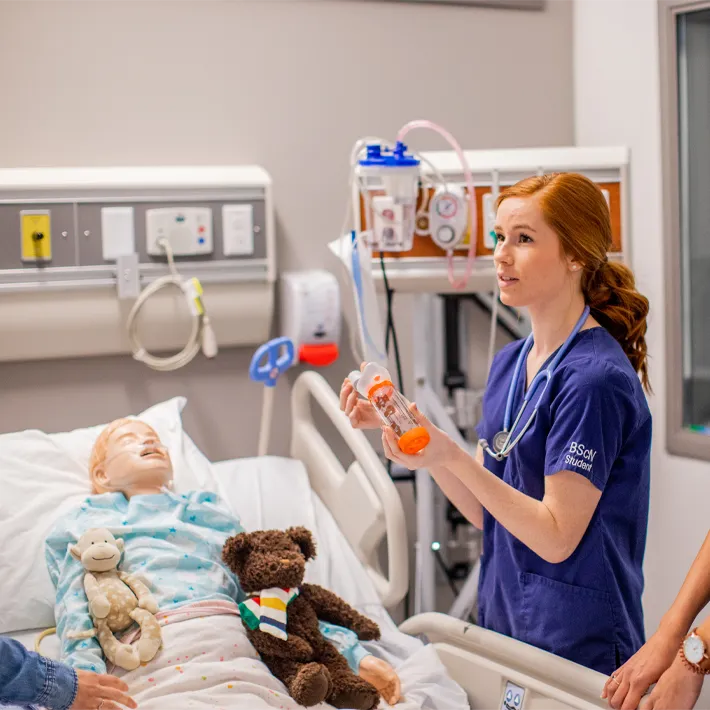
Registered Nurses have many career options open to them as they are prepared to care for individuals, families, and communities in varied settings. Our graduates assume roles as clinical practitioners, health program and policy developers, researchers, administrators and teachers. Careers can be found in hospitals, community health agencies, public health units, government health agencies and public and private corporations in both urban and rural settings.
Completion of Lambton College's BSNB - RPN Bridging to Honours BScN degree is recognized by several post-secondary institutions across Canada as an approved pre-requisite program to pursue graduate education at a Master's level.
Accreditations & Certifications
Registered Nurse Licensing
The completion of a BSNB degree prepares you for obtaining licensure as a Registered Nurse. Upon completion of the program, students will complete the NCLEX (National Council Licensure Examination for Registered Nurses) registration exam and a jurisprudence exam in the province, territory or state in which you choose to work.
These exams cost an estimated $1,000.
Master's Degree
Students may pursue a Master's degree in nursing or a related field at any university of their choosing.
In order to pursue a Master's degree, you must obtain a minimum of 70% - 75% average in your Bachelor's degree work to be considered for entry to a Master's program.
Placement
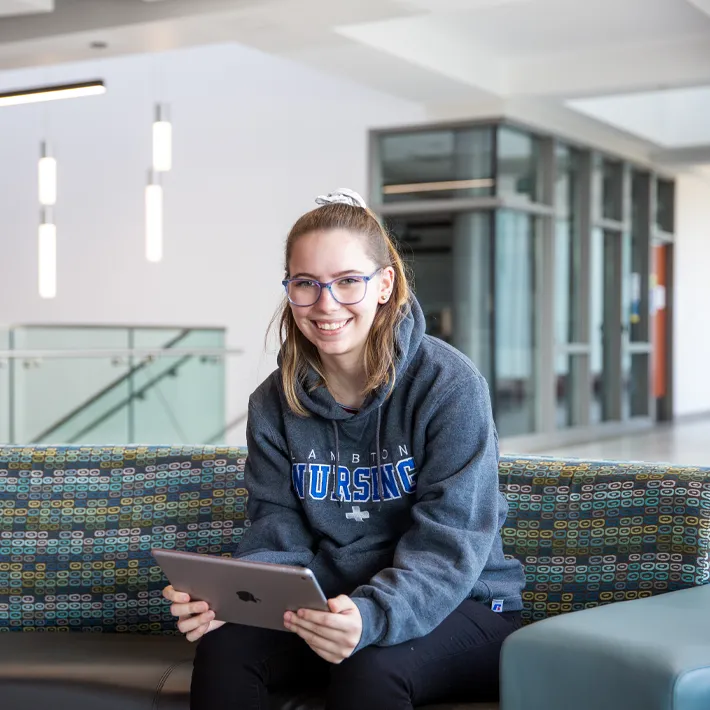
Vaccinations & Police Record Checks
Students considering this program should be aware that there may be field and clinical placement requirements. Many placements require students have proof of certain vaccinations and police record checks.
Once you’ve applied, you can log in to mylambton.ca and view the program-specific Field & Clinical Placement Requirements. If you need information about these requirement before applying, please contact placementinfo@lambtoncollege.ca.
Placement Courses
Students are to complete the opposite clinical practicum in Term 8 of what was taken in Term 7. Each student must complete both BSNL-4977 and BSNL-4987 to be eligible to graduate.
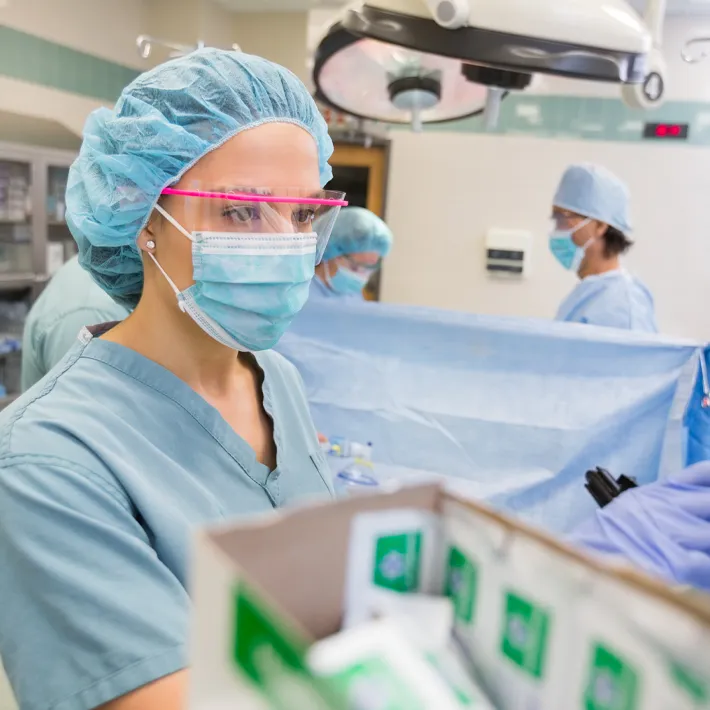
More Information
Technology Requirements
It is recommended that students purchase a laptop with a Windows operating system.
Internet Speed Requirements
For best performance for students learning remotely, an internet connection with a minimum of 40 Mbps download and 10 Mbps upload speed is recommended in order to effectively use video conferencing and remote lecture delivery software as well as, other online resources remotely. Due to the large area over which students may be dispersed, we are unable to recommend a specific provider, so you will need to inquire around your area to find one that best suits your needs.
Minimum Laptop Requirements
In order to access the internet and virtually-delivered software and courseware, student laptops should include the following at a minimum. By meeting the following specifications, students will be equipped to access software and courseware on their laptop through the internet:
- Intel i5 8th Gen Processor or equivalent
- 16 GB of RAM (with a minimum of 8 GB)
- 100 GB HDD or more
- HD Graphics
- Webcam with a microphone
- Wireless 802.11n/ac 5ghz capable
- Windows Operating System (Windows 11)
Software
To ensure students are getting the most our of their classroom experience, some software will be required.
Lambton College has made this software easily accessible online. Students can leverage our Microsoft Office 365 software packages and services. In addition, much of the software you require for your courses will be available on demand for use on any device - on or off campus.
